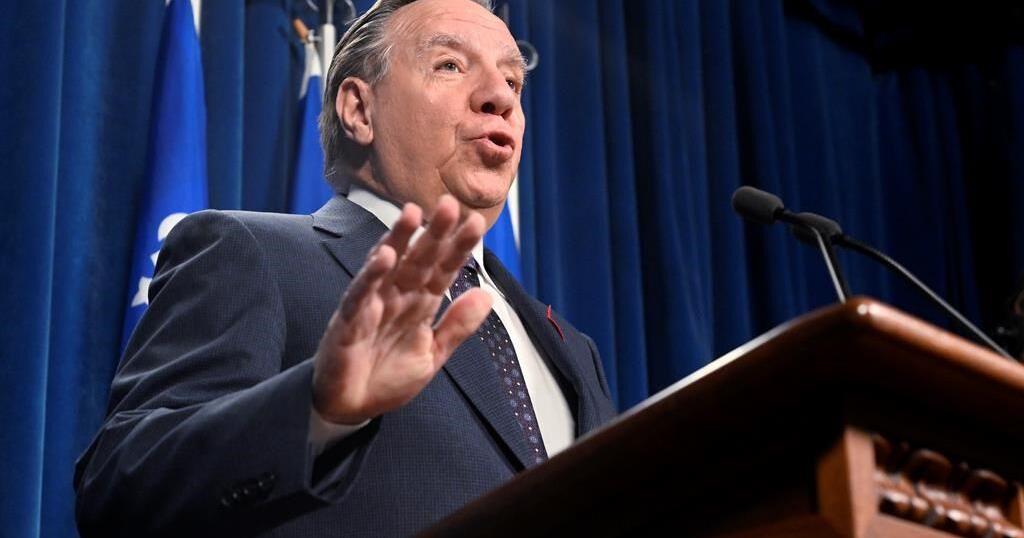MONTREAL – Quebec Premier François Legault is raising concerns about the prospect of a “massive influx of immigrants” to the province following Donald Trump’s victory in the U.S. presidential election, and he says Quebec has already reached capacity.
During a news conference Wednesday in Quebec City, Legault said Canada must “act quickly” to secure its borders against a possible wave of migrants looking to escape Trump’s threat of mass deportations.
“We’ll be calling on the federal government to fulfil its responsibility to protect our borders,” he said. “The problem isn’t immigrants, it’s the number. We already have too many. So we shouldn’t add to the problem.”
Legault said Quebec could help the federal government monitor the border and airports, though he offered few details. He said he wants to “follow up every week” with Ottawa about the number of new arrivals in the province.
Trump has promised to deport millions of undocumented immigrants as one of his top priorities, raising the prospect of a repeat of what happened after his 2016 election. His immigration policies during his first mandate helped propel a steady influx of asylum seekers north to Canada, largely through Quebec.
Immigration experts say Quebec and the rest of Canada are likely to see an increase in asylum claims following Trump’s re-election Tuesday, but they say it will probably look quite different this time around. That’s in large part because of changes to the Safe Third Country Agreement, which have made it harder for people in the United States to seek asylum in Canada.
Chantal Ianniciello, vice-president of humanitarian aid for Quebec’s immigration lawyers’ association, said that even before the election, she and her colleagues were hearing from undocumented immigrants south of the border who were worried about a second Trump presidency. “So I think it’s plausible that there will be people who want to leave the United States to migrate north,” she said in an interview.
After Trump’s first election, a wave of asylum seekers began entering Canada illegally, mostly along Roxham Road in rural Quebec. Initially, many of them were Haitian, driven north by the Trump administration’s decision to rescind a protected status that had prevented their deportation following the 2010 Port-au-Prince earthquake.
They came through Roxham Road because of a loophole in the Safe Third Country Agreement, which requires people to claim asylum in whichever country they get to first. Last year, Canada and the U.S. modified the agreement, effectively closing Roxham Road. Up to then, nearly 100,000 people had used it to enter the country.
Now, Ianniciello said, the only way for most people coming from the United States to claim asylum in Canada is to enter the country illegally and remain undetected for more than two weeks, since the revised agreement applies to anyone who makes a claim within 14 days of crossing the border. She said that added challenge means a flood of asylum seekers is unlikely.
“Don’t think that tomorrow hundreds of thousands of people will show up at our doors,” she said. “The situation here won’t be easy for them either.”
She also said it’s less likely now that Quebec would be the primary entry point for asylum seekers, since Roxham Road has been closed. Instead, people may try to enter Canada in various remote locations across the country.
But Ianniciello said people living under the radar in the United States should think carefully about whether they want to take the risk, because if they are turned away from Canada it will alert U.S. authorities to their presence.
Luna Vives, a professor of geography at the Université de Montréal who studies migration, said Trump’s promise to eject millions of undocumented immigrants “may not be feasible” because of how complicated it is to arrange deportations. “But still, it may cause some people who fear that they may be deported to look elsewhere for a place to go,” she said.
She said the closure of Roxham Road means migrants are more likely to hire smugglers to help them cross the border undetected, which could lead to deaths. “Smugglers will rush to fill the gaps,” she said. “There’s a lot of money to be made.”
Legault has long complained that Quebec is hosting more than its fair share of asylum seekers and has too many non-permanent residents, whom he blames for the province’s housing shortage. His government has recently taken steps to limit temporary foreign workers and international students in the province, and has announced a moratorium on two permanent immigration programs.
Parti Québécois Leader Paul St-Pierre Plamondon, who has taken a harder line on immigration than the governing Coalition Avenir Québec, warned earlier in the day that millions of people might consider moving north following Trump’s election.
He told reporters that Canada has “one of the most porous and poorly managed borders in the western world,” and that Legault and Prime Minister Justin Trudeau are “a disaster in terms of borders and immigration management.”
Abdulla Daoud, executive director of the Refugee Centre, a Montreal non-profit that supports newcomers, said there’s a lot of “fear-mongering” around the prospect of a new wave of migrants. “If we are going to see increased numbers, they’re going to happen gradually,” he said. “It’s going to be over years. It’s not going to be over days.”
He said Canada may be more likely to see an increase in asylum seekers from other countries who are avoiding the United States as opposed to people trying to head north across the border.
This report by The Canadian Press was first published Nov. 6, 2024.
